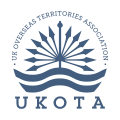The Royal Navy’s Partnership with Overseas Territories in the Caribbean
UKOTA warmly welcomes and values the work done by the Royal Navy to support Territories in the Caribbean. This is now being achieved in a new way. From on board HMS Medway, Lt Cdr Francesca Woodman has sent this report.
While the Royal Navy has kept ships in the Caribbean for centuries, there has been an important change in the way this is done. Instead of rotating ships every six months or so, the Offshore Patrol Vessel HMS Medway will now represent the Royal Navy in the Caribbean for several years. By rotating part of the crew every six weeks, Medway is able to stay in the region for much longer than previous ships, which typically returned to the UK after six months. This change is an example of the UK’s shift to persistent engagement around the globe, set out in this year’s Integrated Review of defence and security policy. In practical terms, it means that Medway can build and maintain partnerships with the Caribbean OTs and with regional states.

Crown Copyright 2021
Pictured: HMS MEDWAY in the Caribbean Sea
One of Medway’s roles in the Caribbean is Humanitarian Assistance and Disaster Relief (HADR) in the immediate aftermath of a hurricane or other natural disaster. As the hurricane season (June to November) is the time of greatest risk for natural disasters, the Royal Navy bolsters its presence with the formation of a Caribbean Task Group. This is increasingly important with the effects of climate change resulting in an increasing number and intensity of hurricane strength storms. The Task Group brings additional capabilities to the region and this year consists of HMS Medway, the Fleet Support Ship RFA Wave Knight and its embarked Wildcat HMA2 helicopter (which supports initial damage assessment and urgent movements ashore) and the Crisis Response Troop drawn from 24 Commando Royal Engineers (which has the capability to help clear roads and open airports). Although the Task Group is small, it is key to opening up access for the forces and additional equipment held at very high readiness in the UK, ready to fly into the region to support any disaster relief efforts.
The UK delivery of HADR operations is part of a cross-government, FCDO-led plan to support the OTs and the wider region. Recent HADR exercises at Montserrat and the Turks and Caicos Islands provide an example of these partnerships in action. They are a valuable opportunity to develop interoperability and disaster relief capabilities. In the exercises there was close collaboration with both OT Regiments. In September the recently formed Turks and Caicos Islands Regiment and the 24Cdo Crisis Response Troop focused their training on initial priorities that would follow a real-life natural disaster. This included conducting road clearance drills and raising emergency communications masts. In July a team from the Royal Montserrat Defence Force observed the Crisis Response Troop, from a safe distance due to Covid-19 restrictions, undertake their disaster relief training on Montserrat.

Crown Copyright 2021
Medway has also hosted officers from the Turks and Caicos Regiment and the Royal Bermuda Regiment to work alongside the Task Group staff in planning for disaster relief. This initiative has been invaluable for sharing knowledge and experience and will continue in the future. It is an opportunity for those who have had personal experience in dealing with hurricane relief to help plan and execute the Task Group’s HADR exercises. Their first-hand knowledge provides a vital input into the planning process.
The Task Group not only helps build relationships and support its partners during training evolutions, it also provides support during real emergencies. After the devastating Haiti earthquake in August the Task Group’s Wildcat helicopter undertook daily reconnaissance flights to photograph and evaluate damage to bridges, roads and hospitals. The swift turnaround of images supported the movement of aid along the Tiburon Peninsula, demonstrating the flexibility and utility of having forward deployed maritime forces at readiness in the area.

Crown Copyright 2021
A further example of cooperation in the region occurred when helicopter support was provided to St Vincent to help place new sensors around the Soufriere volcano. These sensors, replacing those destroyed in April’s eruption, will provide early warning of future eruptions and so help in getting people evacuated in good time. The Navy’s support was organized through the FCDO, showing the value of cross-government integration.
In addition to HADR, a second role undertaken by the Task Group is counter-illicit trafficking operations. These take place year-round. They are part of the UK’s commitment to provide security in the region and help tackle Serious and Organised Crime. It is conducted in close cooperation with international partners. There has been considerable success in the last five years, with RN and RFA patrols seizing or disrupting approximately 11 metric tonnes of cocaine and cannabis in the Caribbean – worth over £750 million had those drugs reached the streets.

Crown Copyright 2021
Pictured: His Excellency Nigel Dakin CMG speaking with the Turks and Caicos Regiment on Salt Cay.
In conclusion, the Royal Navy provides a persistent presence in the Caribbean to be close at hand to support the Overseas Territories and its people. With HMS Medway in the region for several years the opportunity to build relationships and support partners will set the ground for future shared training and professional development.




